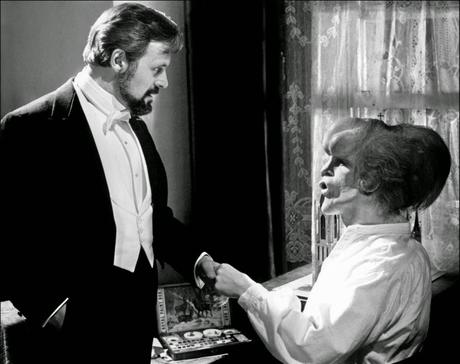 After his mind-screw Eraserhead (1976), David Lynch tackled a more commercial project. The Elephant Man (1980) is a compassionate monster movie starring a human. Beautifully shot, smartly written and brilliantly acted, it's a winner on all fronts.
After his mind-screw Eraserhead (1976), David Lynch tackled a more commercial project. The Elephant Man (1980) is a compassionate monster movie starring a human. Beautifully shot, smartly written and brilliantly acted, it's a winner on all fronts.England circa 1884. While visiting a London freak show, Dr. Frederick Treves (Anthony Hopkins) encounters John Merrick (John Hurt). Hideously deformed by neurofibromatosis, Merrick comes billed as "the Elephant Man." Treves takes Merrick to the London Hospital, where he discovers the man can speak. Treves befriends Merrick, shields him from showman Bytes (Freddie Jones). Yet as he introduces Merrick to London society, Treves wonders if he's also exploiting his patient.
Stylistically, The Elephant Man crosses David Lean's Dickens adaptations with a Universal horror film. Filming in stark black-and-white, Lynch and cinematographer Freddie Francis completely avoid period glamor. Instead Elephant inhabits cramped interiors, the outside world glimpsed through filthy circuses and grungy Whitechappel dives. Lynch limits weirdness to a few dream sequences (including elephant rape) but keeps viewers off-balance with gruesome sounds (Merrick's wheezing, an omnipresent industrial whir, John Morris's jingly score) and images.
Elephant benefits from its sensitive script. Like a subverted monster movie, it begins as horror before shaving away Merrick's strangeness; Elephant even has Merrick chased by a Frankenstein-esque mob. Lynch doesn't make Merrick a malformed Forrest Gump, either: he wants nothing more than to take tea and sleep like ordinary people. Transformed from mute reject to social butterfly, Merrick becomes euphoric until a prolonged, third act humiliation. Elephant Man ends on a note both transcendent and tragic, allowing Merrick an irrevocable moment of normalcy.
Lynch contrasts Merrick's humanity with social ugliness. Victorian England has no more use for Merrick than the mutilated steelworker Treves treats in hospital, exploited until useless. Bytes poses as Merrick's benefactor but ruthlessly beats him; Jim (Michael Elphick) invites bar patrons to gawk. Even Treves views him less as man than curiosity, enjoying his notoriety as the Elephant Man's benefactor. Merrick's strict nurse (Wendy Hiller) and actress Madge Kendal (Anne Bancroft) are Elephant's most compassionate characters: they're utterly straightforward, treating Merrick as a person.
Anthony Hopkins breathes compassion and self-doubt into Treves' characterization. He's marvelously restrained: when Treves explodes into a trademark Hopkins rant, it has real impact. John Hurt is heartbreaking with his breathless delivery and anguished mannerisms; Merrick's humanity shines through mountains of makeup. Wendy Hiller's icy haughtiness steals every scene; John Gielgud balances with measured gentility. Anne Bancroft has an affecting cameo, charmingly eccentric. Freddie Jones and Michael Elphick (channeling Robert Newton) make hateful villains.
If David Lynch is inexorably linked with vivid surrealism, he's also adept at human stories (Mulholland Drive, The Straight Story). The Elephant Man's power derives from its nuanced characterization: Merrick's tragic yes, but also pitiably human. Whether monstorus or not, it's easier to empathize with man than martyr.

